If you’ve ever Googled for energy drink recommendations, chances are someone will tell you, “Go try Celsius!”
Celsius has made quite the impression on the energy-drinking community. Many reviewers are singing its praises to high heaven, and claiming that Celsius has really good ingredients.
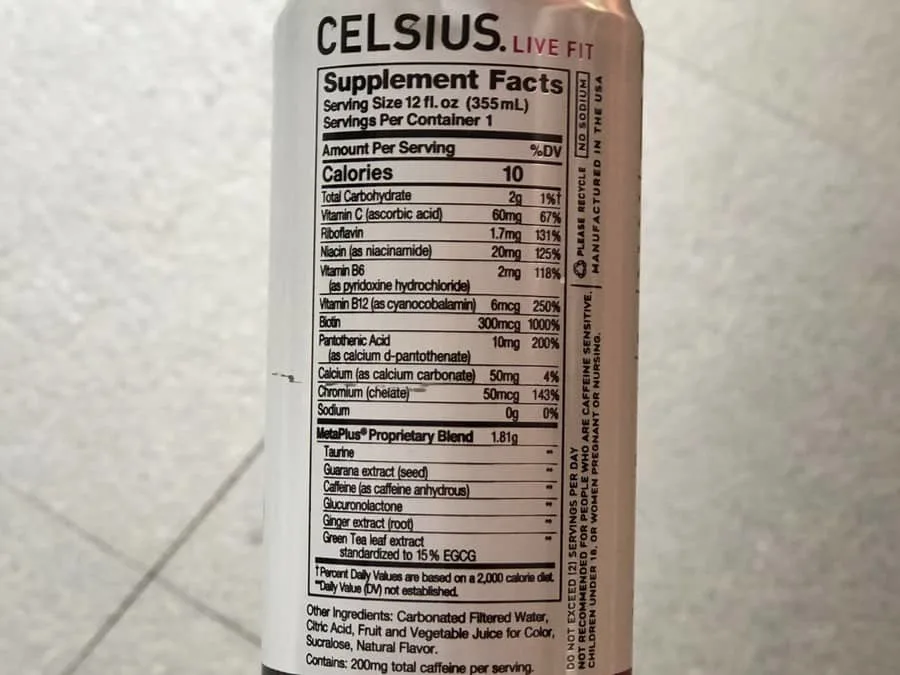
Is there any truth to these claims? What are the ingredients used in a can of Celsius Energy Drink, and how are they special or different from those used in other brands?
According to my analysis, Celsius packs a reasonably large amount of caffeine, a dash of natural flavors and extracts, an oversupply of vitamins, and a sprinkling of artificial sweeteners.
Read on for a detailed breakdown of the ingredients found in Celsius Energy Drink, the controversies surrounding some of those ingredients, and the significance of the Percent Daily Value of a can of Celsius.
Please note that in this article, I will only be discussing Celsius ‘Originals’, the regular version of Celsius. The other versions, or sub-brands, of Celsius Energy Drinks (‘Heat’, ‘Stevia’, ‘BCAAs’ and ‘On-The-Go’), which contain extra or unique ingredients, will not be mentioned here except in the case of examples.
Contents
Celsius Energy Drink Nutrition Facts
| Nutrient | Amount | Percent Daily Value* (%DV) |
| Calories | 10 | – |
| Total Carbohydrate | 2g | 1% |
| Vitamin B2 or Riboflavin | 1.7mg | 131% |
| Vitamin B3 or Niacin (as niacinamide) | 20mg | 125% |
| Vitamin B5 or Pantothenic Acid (as calcium d-pantothenate) | 10mg | 200% |
| Vitamin B6 or Pyridoxine (as pyridoxine hydrochloride) | 2mg | 118% |
| Vitamin B7 or Biotin | 300mcg | 1000% |
| Vitamin B12 or Cobalamin (as cyanocobalamin) | 6mg | 250% |
| Vitamin C or Ascorbic Acid | 60mg | 67% |
| Calcium carbonate | 50mg | 4% |
| Chromium (chelate) | 50mcg | 143% |
*Based on a 2000 calorie diet.
Ingredients in Celsius Energy Drink
Aside from those listed in the table above, a can of Celsius also contains:
- MetaPlus® Proprietary Blend
- Taurine
- Guarana extract (seed)
- Caffeine (caffeine anhydrous)
- Glucuronolactone
- Ginger extract (root)
- Green Tea Leaf extract (15% EGCG)
- Carbonated Filtered Water
- Citric Acid
- Fruit and Vegetable Juice
- Sucralose
- Natural Flavor
The company also took great pains to ensure customers of the benefits of the product by displaying the following claims on the can in large, embolden letters:
- 0 Sugar, Gluten Free
- No High Fructose Corn Syrup
- No Aspartame
- No Preservatives
- No Artificial Colors or Flavors
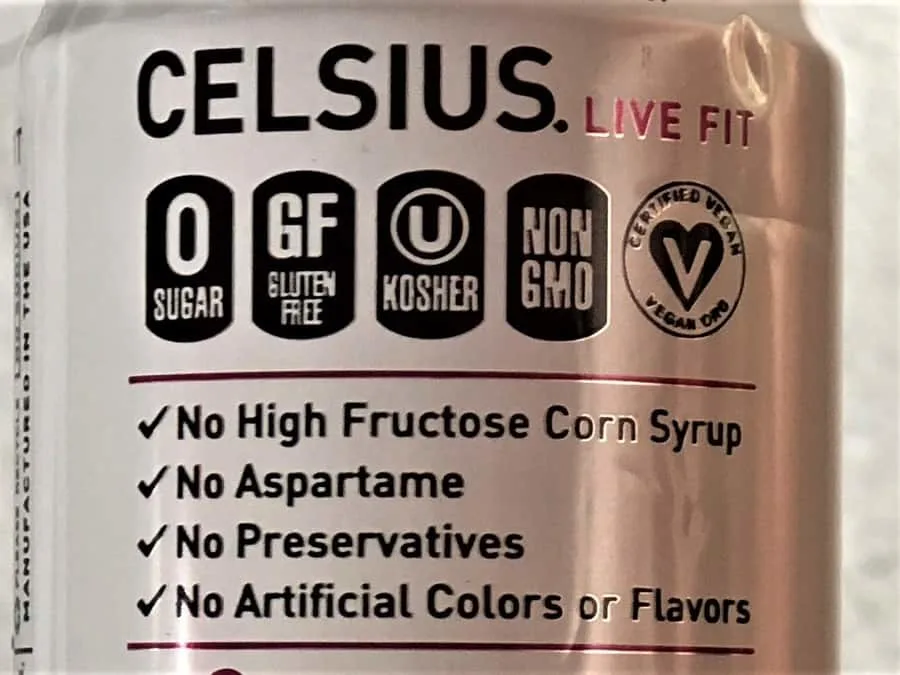
We will take a look at these claims further on.
Caffeine in Celsius Energy Drink
A can of Celsius contains 200mg of caffeine.
The daily maximum limit of caffeine recommended by the FDA is 400mg. 200mg can be considered a reasonable amount, not too much but not too little.

DO NOT exceed (2) servings a day.
NOT RECOMMENDED for people who are caffeine sensitive, children under 18, or women pregnant or nursing.
Stated on Celsius’ nutrition label.
I love that Celsius gave these warnings on the nutrition label because two cans would indeed add up to the daily limit of the recommended caffeine intake.
That being said, my advice is to not drink 2 cans a day. Too much caffeine intake at once, or even a small amount for someone who cannot handle that much caffeine, might cause the following effects:
- Insomnia
- Shakiness
- Anxiousness
- Increased Heart Rate
- Stomachaches
- Nausea
- Headaches
- Dysphoria
On the can label, it states that Celsius’s caffeine comes from caffeine anhydrous, a highly concentrated and potent powder form of caffeine.
Due to its potency, caffeine anhydrous has the potential to cause an overdose from even the smallest error in measurement. It also shares the same overdose risks as caffeine.
Celsius ‘Heat’, one of the sub-brands, contains a much higher caffeine content than the other versions with a total of 300mg in a single can. It is marketed as a ‘workout drink’, in contrast to the others, which are marketed as ‘fitness drinks’.
Sugar in Celsius Energy Drink
Although there’s supposedly no sugar in Celsius, the nutrition label suspiciously mentions there being 2 grams of total carbohydrate in the product.
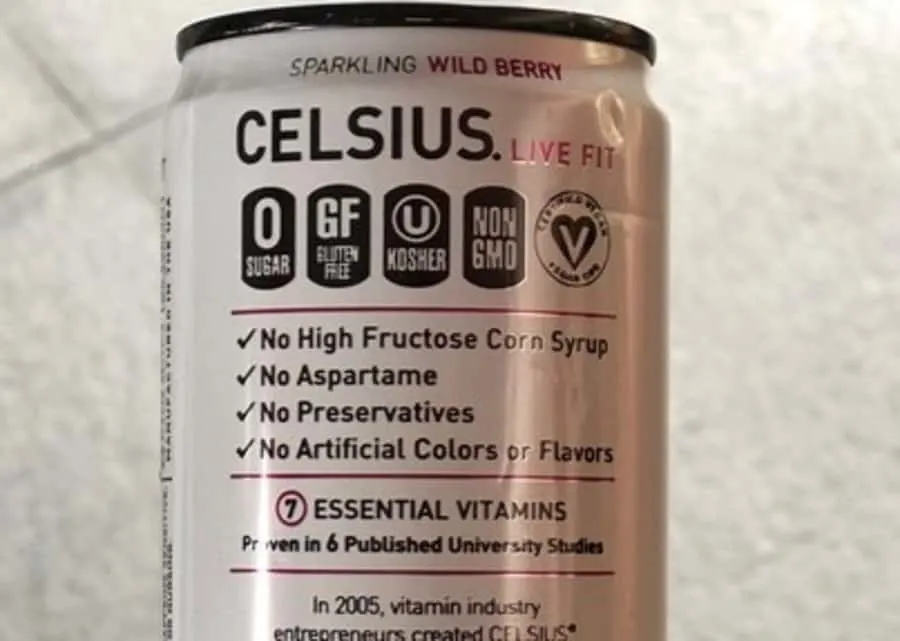
It is important to note that carbohydrates, in whatever form or amount, will eventually be broken down by your body as digestible sugar.
Total Carbohydrates in Celsius
We do not know what this ‘total carbohydrate’ contains— it’s probably a form of digestible carb that is not considered a sugar.
According to WebMD, the ‘total carbohydrate’ on nutrition labels can be split into these subcategories:
- Sugars (not present in Celsius)
- Other carbohydrates
- Sugar alcohols (not present in Celsius)
- Dietary fiber (non-digestible)
The category “other carbohydrate” represents the digestible carbohydrate that is NOT considered a sugar (natural or otherwise).
WebMD (emphasis mine)
Therefore, we can hypothesize that the 2 grams of total carbohydrate in Celsius solely consists of this ‘other carbohydrate’ category.
That being said, the “bitter” truth about sugar is that “no sugar” actually means “no added sugar”, a loophole that many companies use to pass off their products as the healthier alternative.
Even if a formula does not list processed sugar as an ingredient, natural sugars in other ingredients like fruit and vegetable concentrates will add up to the overall sugar or carbohydrate content in the product.
So, the ingredient listed as “Fruit and Vegetable Juice for Color” may be the most likely culprit for the 2 grams of carbohydrate that is present in a can of Celsius Energy Drink.
If you are watching your carb intake, please consult your physician if you want to know whether Celsius’s total carbohydrate will make a difference in your diet.
Celsius Energy Drink Calorie Content
The 10 calories in Celsius probably come from some ingredient that contains fat.
Calories don’t necessarily come from sugar, but also from proteins and fats when they are broken down.
Sucralose in Celsius Energy Drink
Sucralose is a type of artificial sugar used as a sweetener in Celsius. It is supposedly 600 times sweeter than sucrose while bearing no nutritional value.
Celsius famously prides themselves as having No Artificial Flavors, and considering sucralose isn’t exactly an artificial ‘flavor’ (it’s categorised as an artificial sweetener), this still technically holds true.
The other thing I like about (Celsius)— no artificial flavors, no artificial sweeteners, no high fructose corn syrup, no preservatives… Energy drinks get a lot of bad rep because they’re full of crappy ingredients.
Fitness Deal News (around the 2:13 mark)
However, sucralose IS a type of sweetener, having been approved by the FDA.
While artificial sweeteners may be marketed as a healthier alternative to processed sugar, many studies have shown that they come with their own set of risks.
One study links non-caloric sweeteners (such as sucralose) with causing glucose intolerance. Another study calls for a reduction of sweetener usage, due to its potential for causing obesity and other diseases.
In this research, sucralose potentially impairs insulin sensitivity ONLY in the presence of carbohydrates. Remember the 2 grams of total carbohydrate that we talked about earlier?
Note that Celsius ‘Stevia’, a sub-brand of Celsius, replaces sucralose with Stevia as a sweetener, which may be a healthier option, although more research is needed to confirm its safety for long-term use.
At the end of the day, if you are watching your carb intake, please consult your physician before taking Celsius.
MetaPlus® Proprietary Blend in Celsius Energy Drink
Celsius’s MetaPlus® Proprietary Blend is made of taurine, guarana extract, caffeine anhydrous (here is where the caffeine comes in), ginger extract, green tea leaf extract and glucuronolactone.
Taurine
Taurine is a conditionally essential amino acid that helps with supporting the functions of your central nervous system and eyes, helps form bile salts and is good for stroke and cardiovascular disease prevention.
Taurine is not used to build proteins, unlike other amino acids.
In a study of cognitive performance, taurine was shown to improve reaction time, reverse the effects of caffeine withdrawal, and when coupled with glucose, enhanced orienting attention.
Although there has been no evidence showing taurine to cause any adverse health effects, concern has been raised since not enough research has been conducted on the effects of large quantities of taurine in combination with other ingredients commonly found in energy drinks.
Energy Drinks: An Assessment, Comprehensive Reviews
Guarana Extract
Guarana seed extracts are said to possess strong antimicrobial and antioxidant properties, as well as packing a dose of caffeine almost twice the number of coffee beans.
With already 200mg of caffeine in Celsius, guarana extract only brings the overall stimulant amount higher, another reason why you should not take more than one can of Celsius Energy Drink in a single day.
Ginger Extract

Ginger extract is not only an antioxidant, but it supposedly aids in a process known as thermogenesis.
Thermogenesis is what Celsius markets as its way of burning fat. Basically, raising the body’s temperature through energy drinks forces the body to burn fat.
Some have argued that thermogenesis from energy drinks is caused by caffeine, not necessarily these natural extracts.
Green Tea Extract with EGCG
Green tea is known for its many healthy properties, as well as containing a bit of caffeine too. Another reason to watch out for caffeine overdose from Celsius.
EGCG is short for epigallocatechin gallate, essentially a compound found in green tea that potentially prevents cellular damage, acts as an antioxidant and when coupled with caffeine, boosts weight loss.
Glucuronolactone
We don’t know how glucuronolactone works, and neither does anyone else, because there is a lack of research in this area.
When even a reputable site like WebMD uses one line to succinctly say “sorry, we don’t know“, you can see just how little we understand about glucuronolactone. There are almost no studies on its functions or benefits.
Red Bull uses glucuronolactone too, claiming it has detoxifying properties, but they reportedly could not back up their claims with scientific proof.
Chromium Picolinate in Celsius Energy Drink
Chelated chromium, also known as chromium picolinate, is trivalent chromium attached to three molecules of picolinic acid.
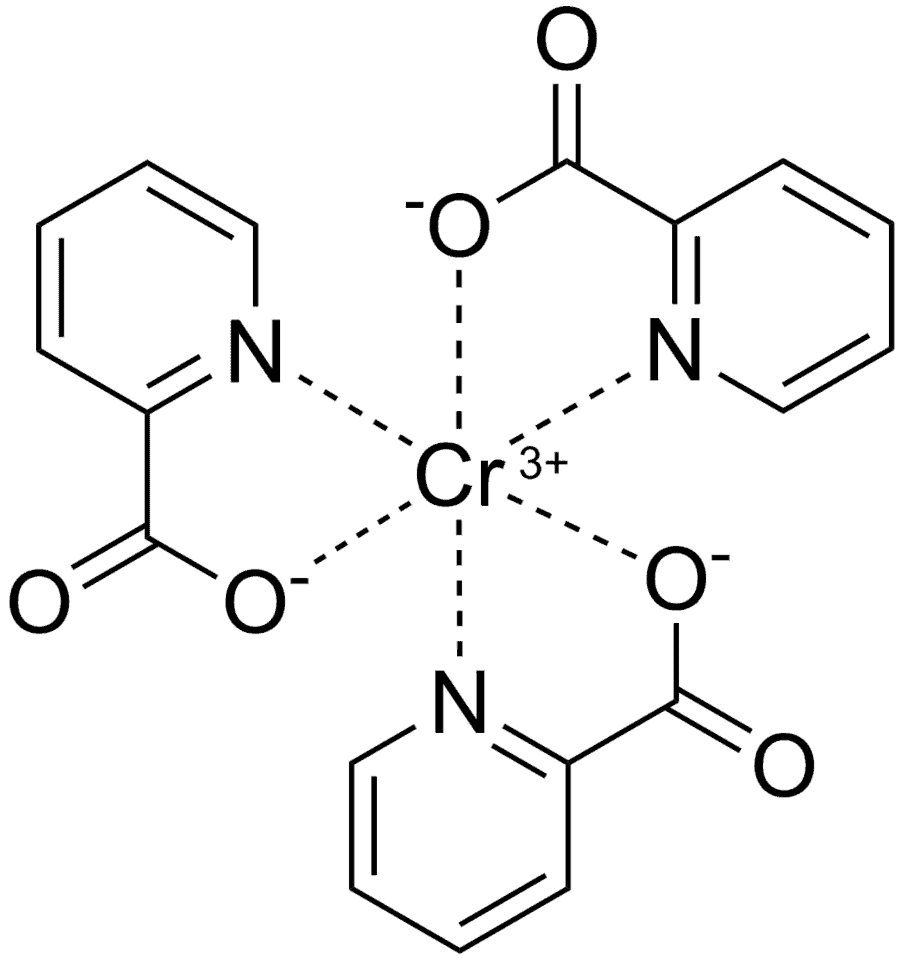
Our bodies need minerals, but some minerals are harder to absorb than others. Chelated minerals are made to speed up absorption and to prevent the minerals from reacting with other substances.
Chromium picolinate is reportedly absorbed better by the body than regular chromium, and it appears to be quite stable in condition.
Vitamins in Celsius Energy Drink
Celsius contains seven essential vitamins, namely vitamins B2, B3, B5, B6, B7, B12, and vitamin C.
Here is a table breaking down what each vitamin does.
| Vitamin | Function |
| Vitamin B2 or Riboflavin | Helps in the digestion and absorption of nutrients; maintains tissue health |
| Vitamin B3 or Niacin (as niacinamide) | Converts nutrients to energy; repairs DNA; supports system as antioxidant |
| Vitamin B5 or Pantothenic Acid (as calcium d-pantothenate) | Breaks down fats, proteins and coenzyme A; promotes healthy skin |
| Vitamin B6 or Pyridoxine (as pyridoxine hydrochloride) | Supports the central nervous system; ensures smooth metabolism |
| Vitamin B7 or Biotin | Metabolizes fats, carbohydrates, and protein |
| Vitamin B12 or Cobalamin (as cyanocobalamin) | Generates red blood cells; maintains brain function and nerve tissue health |
| Vitamin C or Ascorbic Acid | Acts as an antioxidant; maintains bones, skin, and blood vessels |
Note that some vitamins have bracketed words, meaning that they are artificial vitamins. I will discuss more on artificial vitamins in the next section.
Artificial Vitamins
The vitamins B3, B5, B6, and B12 in Celsius Energy Drink are artificial vitamins, which means they are chemically synthesized products.
For instance, natural vitamin B12 is known as cobalamin, but Celsius uses its synthetic form known as cyanocobalamin (yes, the ‘cyano-‘ part comes from actual cyanide).
If you are allergic to cobalt or have Leber’s disease, you should not ingest cyanocobalamin. People have asked for cyanocobalamin to be withdrawn, citing the long-term dangers of cyanide.
Others have questioned the safety of the other synthetic vitamins, but the general consensus is that they are chemically identical to the natural forms.
Nevertheless, some studies show that the synthetic vitamins B2, B3, and B6 are slightly harder to absorb than their natural counterparts.
Studies have yielded mixed results when it comes to synthetic vitamins. WebMD discusses them in-depth here and analyzes if synthetic vitamins cause harm in the long-term or not.
Percent Daily Value (%DV) of Celsius Energy Drink
Percent Daily Value on the Nutrition Facts label shows you how much of the daily recommended intake the product contains.
For example, if the label states 200% of Vitamin B5, it means that one can of Celsius contains 200% of the Vitamin B5 you need daily.
As stated on the can, Percent Daily Values are based on a 2000 calorie diet plan, as it usually is for healthy adults. It is a good benchmark for reference, even if you are on a particular diet.
Low: 5% or less of a nutrient
High: 20% or more of a nutrient
Mayo Clinic, on Daily Values
Our bodies can only hold a certain amount of vitamins at a time, so any extra vitamins that we consume are flushed out and go to waste.
Note that for six out of the seven vitamins, their Percent Daily Value is more than 100%.
To use vitamin B6 as an example, Celsius Energy Drink contains ten times more vitamin B6 than you need in a day, and 90% of that will just be excreted when you go to the toilet. It is also important to note that vitamins are potentially harmful to the body when taken in access.
In conclusion, Celsius Energy Drink contains a ton of vitamins— very useful vitamins, no doubt— but a big portion of those will just make your urine extremely nutritious.
Does Celsius have side effects?
Celsius has caffeine, a stimulant substance that is proven to increase the release of fats into the bloodstream and improve metabolism. While this is not directly a health risk, it may lead to high cholesterol levels.
Also, people who are already struggling with high blood pressure should avoid caffeine. Metabolic acidosis, or diabetic ketoacidosis, is a rare but potentially fatal side effect that can occur with energy drinks. It is caused by high levels of ketones in the blood, which can lead to a buildup of acid in the blood. This can be dangerous and even lead to death.
Is Celsius healthier than Red Bull?
Red Bull and Monster are two well-known energy drinks. In the meantime, Celsius is calorie and sugar-free, whereas Red Bull is not. Not to mention, the differences between the two beverages include caffeine content and price.
Even so, neither Celsius nor Red Bull is inherently superior to the other. It still ultimately depends on the consumer’s preferences, demands, and health conditions.
Personal Opinion
In my opinion, Celsius Energy Drink has a lot of pros, and also enough cons to keep it from being the best in the market.
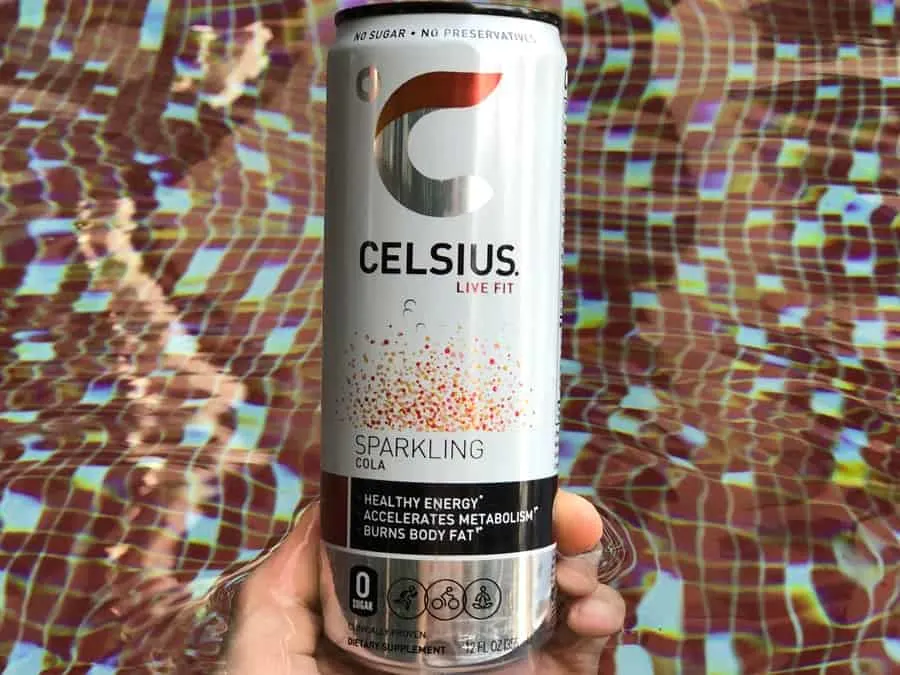
Celsius certainly carries more natural ingredients than other brands, but it also contains a strong dose of caffeine, plus the artificial sweetener that it wasn’t supposed to have.
The mysterious and downright misleading carbohydrate content is also potentially problematic for diabetics and other individuals with similar medical conditions since Celsius Energy Drink is marketed as sugar-free.
All the same, I do have to credit Celsius for trying to cut out as many artificial compounds as possible, at the risk of it not tasting as good as other brands. I haven’t tested it myself, but it was something that was mentioned by the reviewers in the video above by Fitness Deal News.
Does Celsius agree with you? There’s only one way to know for sure— try it for yourself someday!
Other Articles
- Is Celsius Energy Drink Vegan?
- Does Celsius Energy Drink Actually Work?
- Celsius Energy Drink Nutrition Facts
